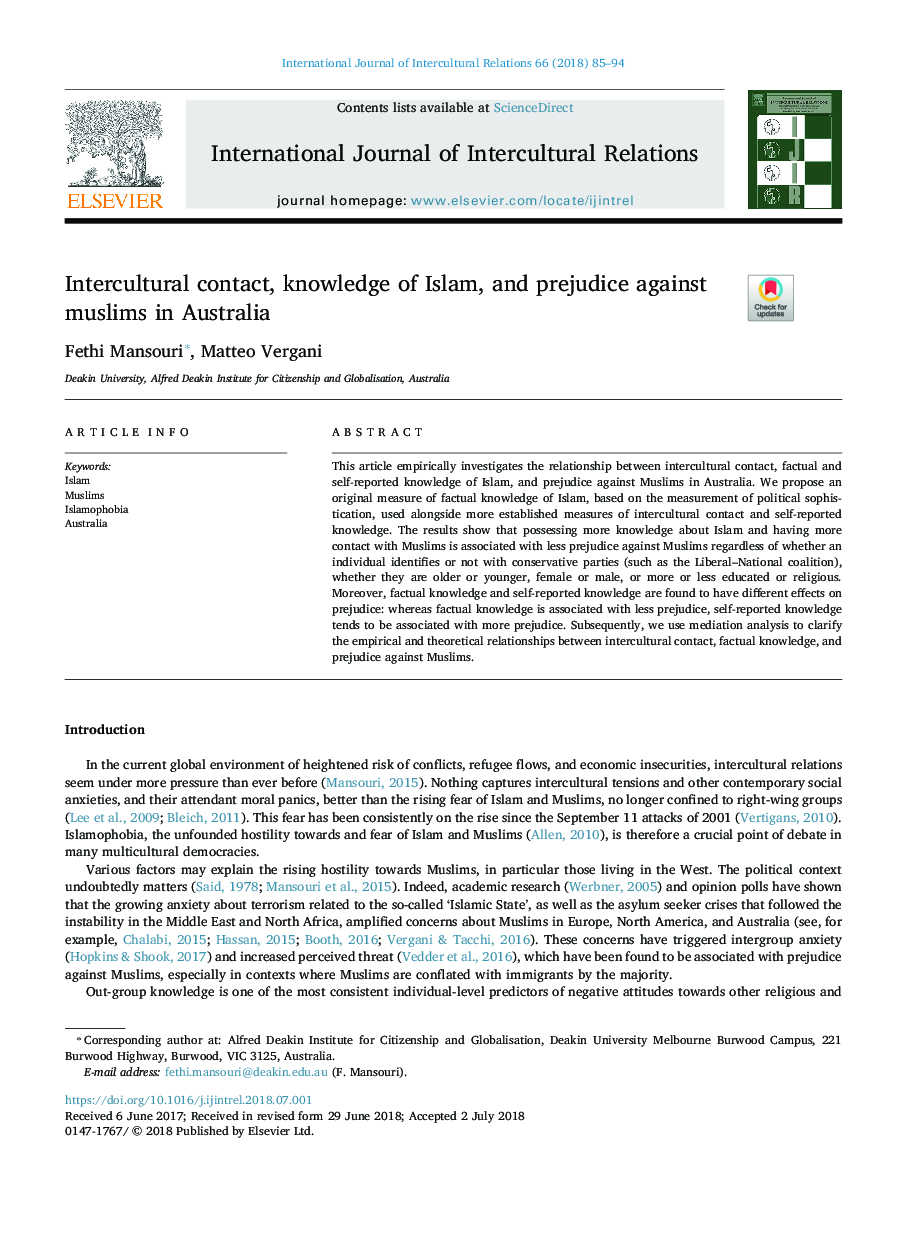| کد مقاله | کد نشریه | سال انتشار | مقاله انگلیسی | نسخه تمام متن |
|---|---|---|---|---|
| 7323593 | 1475724 | 2018 | 10 صفحه PDF | دانلود رایگان |
عنوان انگلیسی مقاله ISI
Intercultural contact, knowledge of Islam, and prejudice against muslims in Australia
ترجمه فارسی عنوان
تماس بین فرهنگی، آگاهی از اسلام و تعصب علیه مسلمانان در استرالیا
دانلود مقاله + سفارش ترجمه
دانلود مقاله ISI انگلیسی
رایگان برای ایرانیان
کلمات کلیدی
اسلام، مسلمانان، اسلام هراسی، استرالیا،
ترجمه چکیده
این مقاله تجربی رابطه بین مخاطبین بین فرهنگی، دانش واقعی و خودپنداره از اسلام و تعصب علیه مسلمانان در استرالیا را بررسی می کند. ما مقیاس اصلی دانش فکری اسلام را بر مبنای اندازه گیری پیشرفت های سیاسی پیشنهاد می کنیم، که در کنار شاخص های بیشتری از ارتباطات میان فرهنگی و دانش خود گزارش شده مورد استفاده قرار می گیرد. نتایج نشان می دهد که داشتن دانش بیشتر در مورد اسلام و داشتن ارتباط بیشتر با مسلمانان با کمترین تعصب نسبت به مسلمانان، صرف نظر از این که آیا فرد با احزاب محافظه کار (مانند ائتلاف لیبرال ملی) یا اینکه آنها سالمند یا جوانتر است یا نه، زن یا مرد، یا بیشتر یا کمتر تحصیل کرده یا مذهبی. علاوه بر این، دانش واقعی و دانش خود گزارش شده، اثرات متفاوتی بر تعصبات دارد: در حالی که دانش واقعی با کمترین تعصب مرتبط است، دانش خود گزارش شده با تعصبات بیشتری همراه است. سپس، از تجزیه و تحلیل میانجیگری برای روشن ساختن روابط تجربی و نظری میان مخاطب بین فرهنگی، دانش واقعی و تعصب علیه مسلمانان استفاده می کنیم.
موضوعات مرتبط
علوم انسانی و اجتماعی
مدیریت، کسب و کار و حسابداری
کسب و کار و مدیریت بین المللی
چکیده انگلیسی
This article empirically investigates the relationship between intercultural contact, factual and self-reported knowledge of Islam, and prejudice against Muslims in Australia. We propose an original measure of factual knowledge of Islam, based on the measurement of political sophistication, used alongside more established measures of intercultural contact and self-reported knowledge. The results show that possessing more knowledge about Islam and having more contact with Muslims is associated with less prejudice against Muslims regardless of whether an individual identifies or not with conservative parties (such as the Liberal-National coalition), whether they are older or younger, female or male, or more or less educated or religious. Moreover, factual knowledge and self-reported knowledge are found to have different effects on prejudice: whereas factual knowledge is associated with less prejudice, self-reported knowledge tends to be associated with more prejudice. Subsequently, we use mediation analysis to clarify the empirical and theoretical relationships between intercultural contact, factual knowledge, and prejudice against Muslims.
ناشر
Database: Elsevier - ScienceDirect (ساینس دایرکت)
Journal: International Journal of Intercultural Relations - Volume 66, September 2018, Pages 85-94
Journal: International Journal of Intercultural Relations - Volume 66, September 2018, Pages 85-94
نویسندگان
Fethi Mansouri, Matteo Vergani,
